Growing onions in containers – the easy way to enjoy homegrown crops in a small space
It's fun, affordable and delivers great results
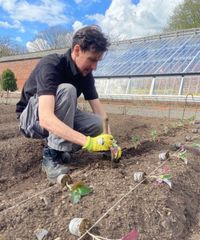
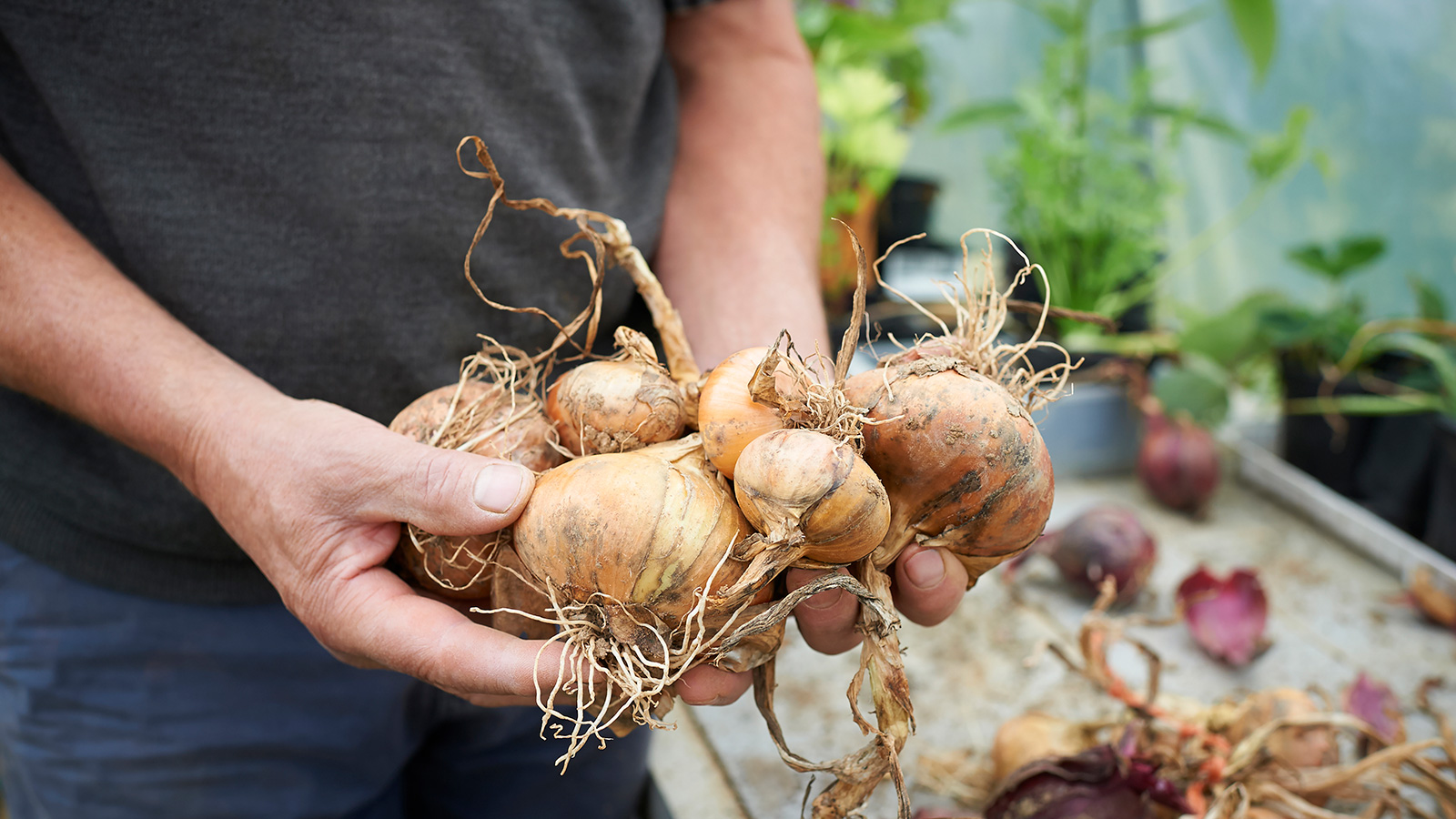
Design expertise in your inbox – from inspiring decorating ideas and beautiful celebrity homes to practical gardening advice and shopping round-ups.
You are now subscribed
Your newsletter sign-up was successful
Want to add more newsletters?

Twice a week
Homes&Gardens
The ultimate interior design resource from the world's leading experts - discover inspiring decorating ideas, color scheming know-how, garden inspiration and shopping expertise.

Once a week
In The Loop from Next In Design
Members of the Next in Design Circle will receive In the Loop, our weekly email filled with trade news, names to know and spotlight moments. Together we’re building a brighter design future.

Twice a week
Cucina
Whether you’re passionate about hosting exquisite dinners, experimenting with culinary trends, or perfecting your kitchen's design with timeless elegance and innovative functionality, this newsletter is here to inspire
Onions are a staple of many vegetable gardens and can even be grown in small yards, on patios, or even on balconies. Growing onions in containers is a fantastic way to cultivate a range of bulbs and enjoy using your homegrown produce in the kitchen.
It opens up opportunities for everyone to grow a simple crop in even the smallest of spaces. There are many different colors, shapes and sizes of onions available to grow. And you will be delighted to know that all of them are suitable for growing in pots or containers.
Growing onions in pots is not really very different to growing them in the ground. Follow a few simple tips and you can get a great crop every time.

Drew is a former professional gardener who specialized as a grower of vegetables and fruit. He worked in productive kitchen gardens growing edibles for chefs for many years, and has also grown a wide selection of vegetables at home. He has lots of experience when it comes to growing a variety of onions.
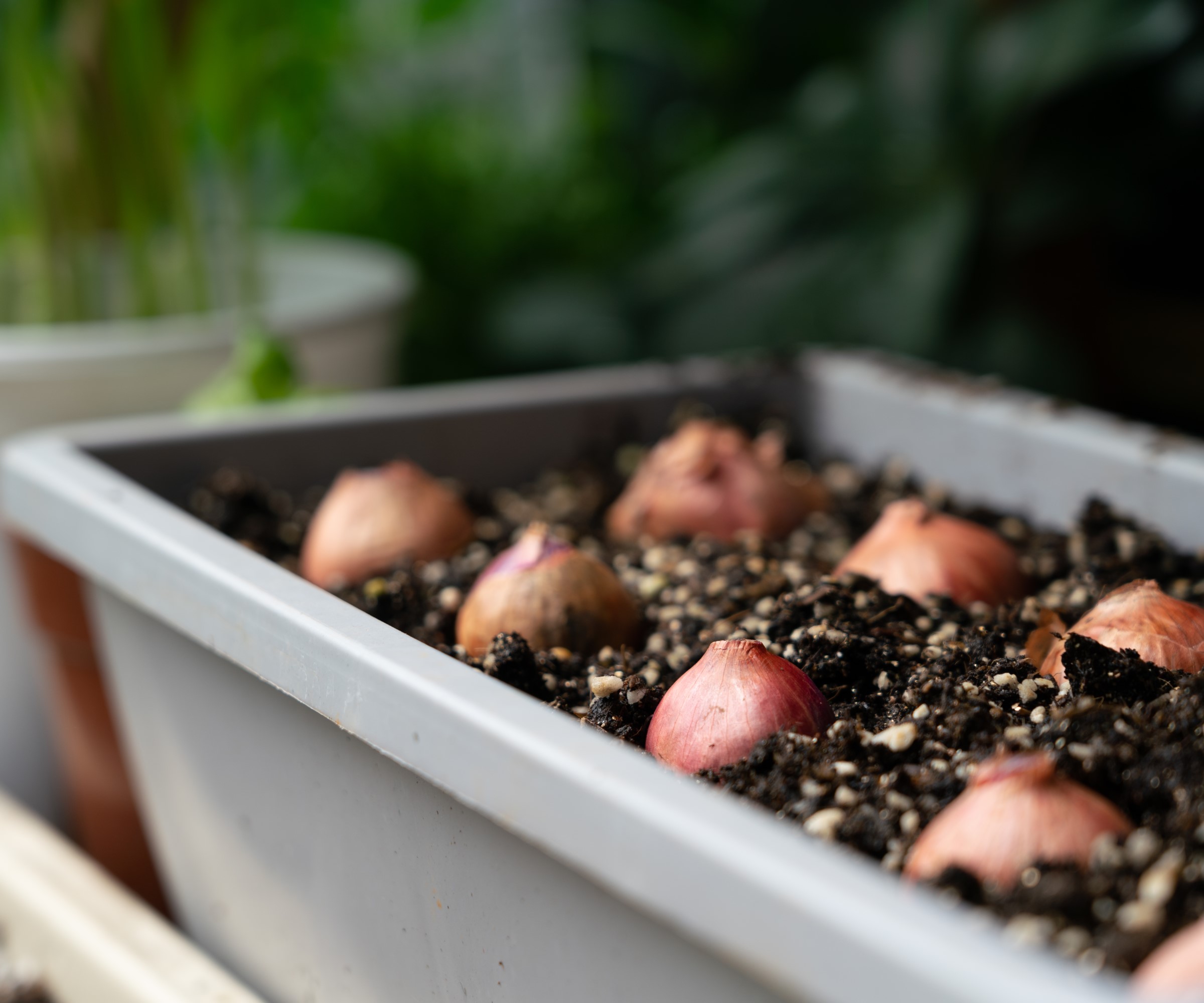
Onions should be spaced six inches apart in containers
3 expert tips for growing onions in containers
Onions should be at the top of any list of vegetable garden ideas. They are very simple to grow for any beginner and also offer a plethora of options when it comes to storing and cooking. As with growing onions outdoors, get the location, soil and fertilizing correct in your container and you can get a bumper crop of bulbs.
There are three key things you will need to consider before you get started.
1. Pick the right container
It is important to choose the right container for growing onions. They need a large outdoor planter, a small pot will not suffice to get a crop of good onions.
Make sure to pick a container that is at least 24 inches wide, a minimum of 10 inches deep, and has good drainage holes. Plastic tubs or wooden crates are alternatives to traditional pots or troughs to grow onions in.
Design expertise in your inbox – from inspiring decorating ideas and beautiful celebrity homes to practical gardening advice and shopping round-ups.
2. Consider your soil and location
Onions like a sunny spot and ideally one that can receive between six and eight hours of daylight. It is a crop that will thrive in the sunniest spot of your yard or balcony, provided it is a sheltered site.
Onions like a loamy soil that is well-draining, such as a good quality compost. Add some extra organic matter or well-rotted manure to the container prior to planting to provide extra nutrients throughout the growing season. It should be a balanced mix made up of two-thirds compost, with one-third organic matter added to further enrich the soil.
3. Choose your preferred onion variety
The next decision you will need to make is how you plan to grow your onions. Knowing how and when to plant onions is critical to getting good results and there are two different approaches you can take – that is choosing seeds or sets. Understanding the many nuances of onion seeds vs onion sets can make a difference to how you grow your onions and the harvest you will get.
Onion sets (available at Amazon) are sold in early spring and are a common way to get a reliable crop of bulbs. Seeds (also readily available online at Amazon) do offer a cheaper alternative to sets and there are more varieties available to choose from. Onions grown from seed to tend to be bigger than those grown from sets.

You can grow onions from seeds or sets in a container
How to plant onion sets in containers
Onion sets are a simple and quick method for growing onions in containers. They are part-grown bulbs that have been started into growth and then stopped.
Sets are traditionally planted in spring and are easily planted. They are simply pushed into the soil, with the pointy end upwards. Make sure they are four inches apart and with the tip just visible above the soil.
Onions grown from sets tend to take around three months to grow from planting. They are easy to maintain, simply by weeding regularly and watering in periods of dry weather until the bulbs have swollen.
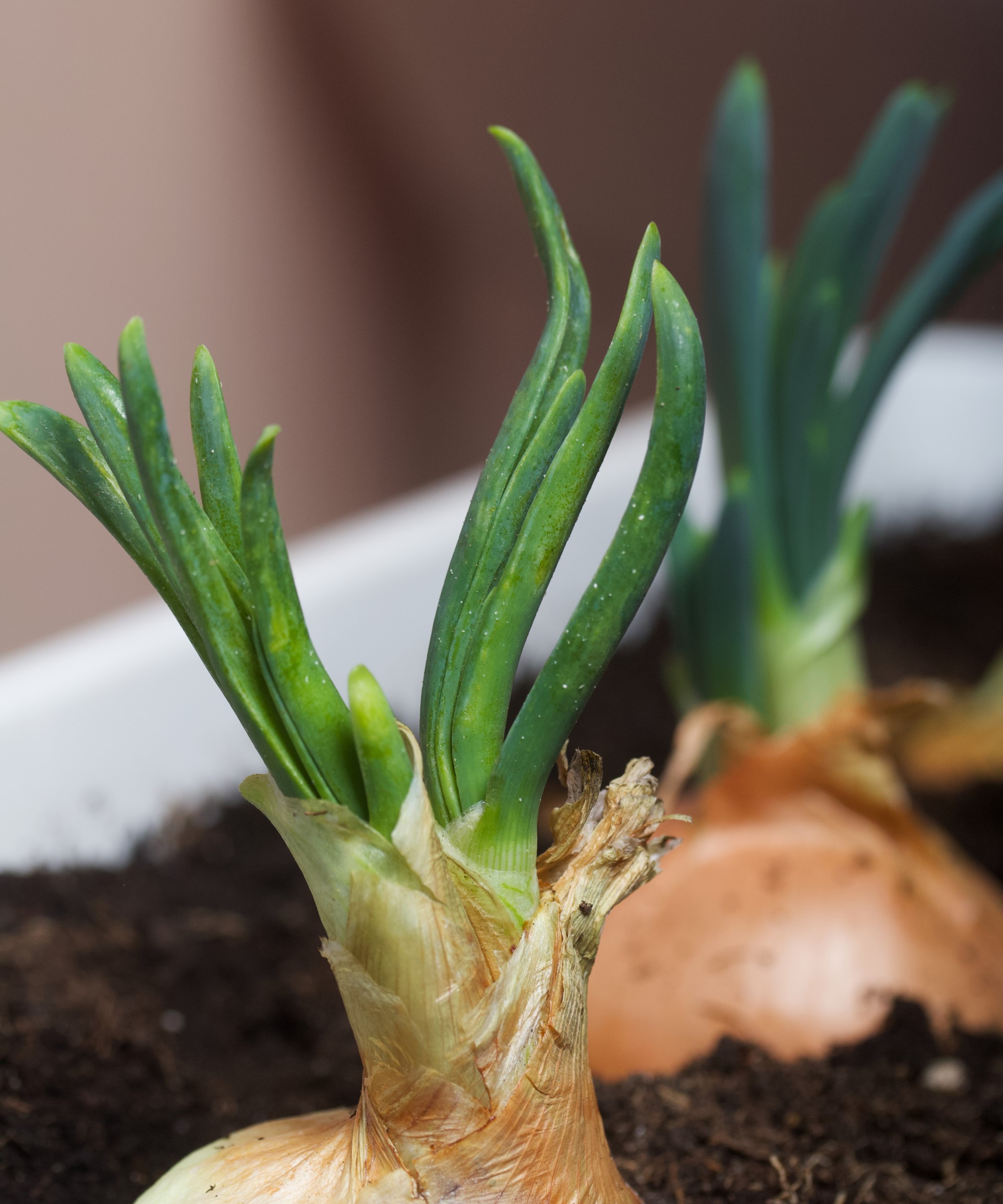
Onions take around three months to grow from sets
How to plant onion seeds in containers
Onions can successfully be grown from seed, either sown indoors in late winter or sowed directly into your container outdoors in spring.
When sown indoors, sow in trays or modules roughly 1⁄2in apart or 1-2 seeds per module and keep them somewhere light and at temperatures of 50-61˚F.
Prick out the seedlings when they are around 5 inches tall and grow them on for another 3 or 4 weeks. It should take 8-10 weeks from sowing to transplanting them outside, after a period of hardening off (getting them gradually accustomed to being outside).
Once the warmer weather arrives in spring, seeds can start being sown in situ outdoor in your container of choice rather than indoors in trays.
Care tips for onions growing in pots
Watering is especially key for vegetable container gardening as the soil can go very dry in a quick space of time. They need to be monitored daily and watered as required, and knowing when to water plants in pots is especially important during periods of very hot and sunny weather.
Ruth Hayes, gardening editor of Amateur Gardening, offers a simple four-stage care checklist for growing onions in containers.
- To keep your container grown onions healthy, and ensure good cropping, weed regularly to reduce competition for nutrients and water.
- Water during prolonged dry spells, and feed the growing plants with sulfate of potash in mid summer, to help ripen the bulbs.
- You can also try mulching around onions to keep in moisture and suppress weeds. A good mulch could be garden compost, straw, or grass clippings
- Don’t let onions flower – if flower spikes form, remove them immediately.
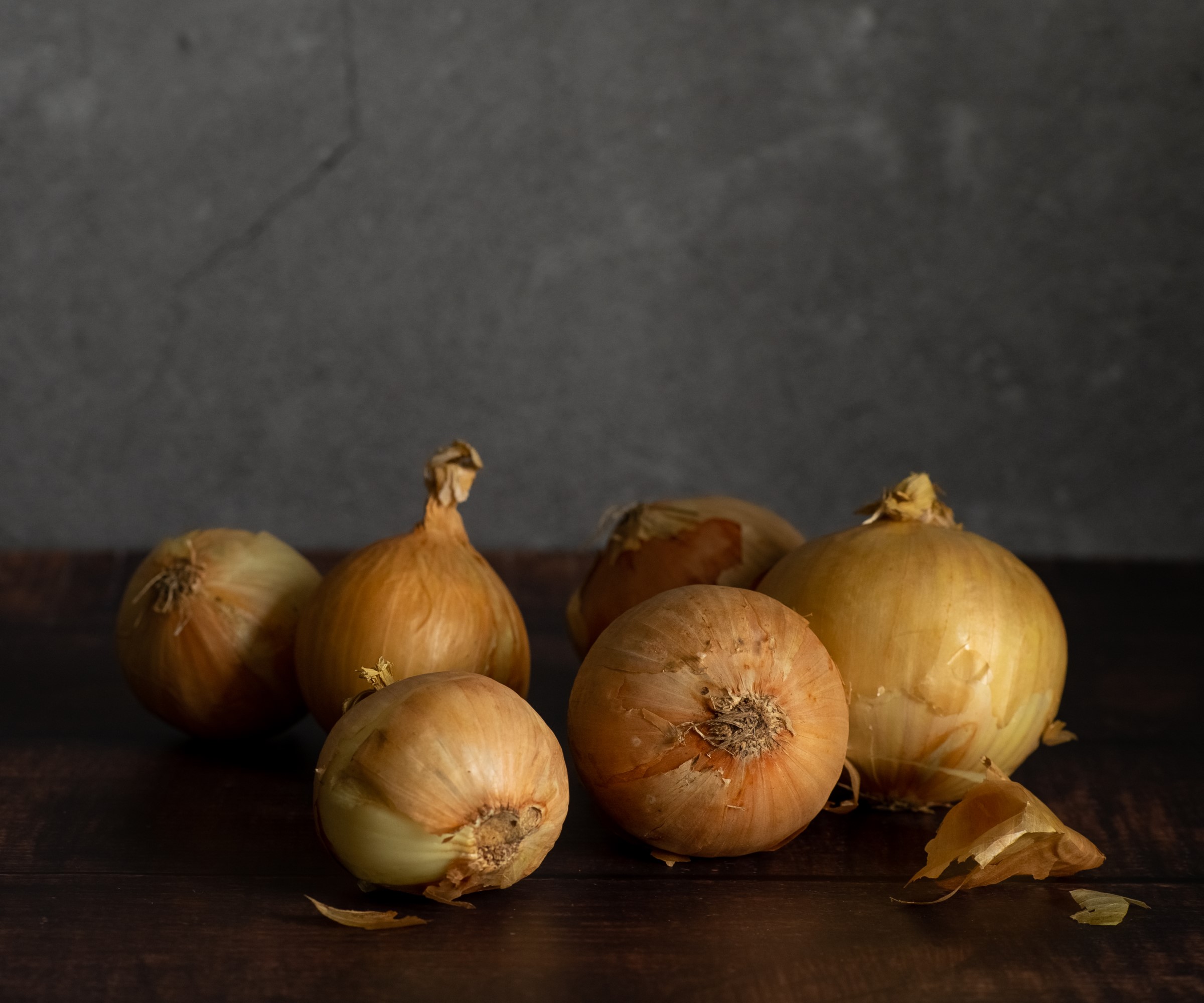
Onions must be cured after harvesting them from your container to dry the outer skin
Can you grow onions in a bucket?
Yes, growing onions in buckets is possible. You can use a 5 gallon bucket to grow between four and six onions in. Make sure any bucket has good drainage holes drilled in the bottom, as onions do not like sitting in overly-wet soil.
Use a good fertile compost that drains well, and mix in one-part organic matter or well-rotted manure when filling. Ensure to give the plants enough light and water, and you can successfully get an onion harvest from a bucket.

Drew has worked as a writer since 2008 and was also a professional gardener for many years. As a trained horticulturist, he worked in prestigious historic gardens, including Hanbury Hall and the world-famous Hidcote Manor Garden. He also spent time as a specialist kitchen gardener at Soho Farmhouse and Netherby Hall, where he grew vegetables, fruit, herbs, and cut flowers for restaurants. Drew has written for numerous print and online publications and is an allotment holder and garden blogger. He is shortlisted for the Digital Gardening Writer of the Year at the 2025 Garden Media Guild Awards.